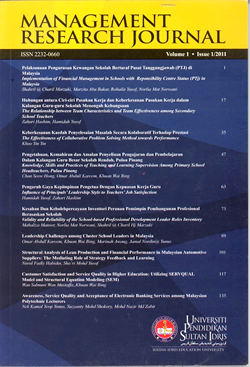A Proposed instrument to measure the Organizational Citizenship Behavior of Teachers in Indonesian context
DOI:
https://doi.org/10.37134/mrj.vol9.sp.5.2020Keywords:
organizational citizenship behavior, teacher organizational citizenship behavior, educational organizationAbstract
This study aims to investigate teacher OCB (Organizational Citizenship Behaviors) dimensions, aspects, and indicators that serve as the basis for developing an instrument to measure teacher OCB. With the Indonesian context, this study is based on a qualitative study conducted by Shaheen et al. The instrument developed in this study uses a summated rating scale model based on self-reports. This study with Design and Development (D&D) research design went through some stages, namely 1) analyzing instrument item by focusing on content, construction, and language; 2) consulting to psychometric and language experts to obtain expert judgment; 3) validating the content through FGD with teachers and principals and trying out the instrument to the teachers individually to see its readability; 4) revising the instrument based on the first trial; 5) testing the instrument to the teacher group; 6) quantitatively analyzing the feasibility of the instrument using statistical methods; and 7) submitting the report/result to stakeholders. Group test results were analyzed using Exploratory Factor Analysis (EFA) by employing the LISREL 8.0 program.The instrument construct was based on the model developed by Shaheen et al. The construct included three factors, namely individual, organizational, and prosocial factors. The results of this study show that there are several rejected items due to the value of factor loading which is less than 0.5. Moreover, some items are rejected because they measure more than one factor mentioned. Besides, based on the analysis, two more OCB factors were added to the previously mentioned three factors. The factors are individual approach by teachers to students, teacher social awareness, teacher tolerance for student weakness and school shortcomings, teacher willingness to approach students’ families, and teaching etiquette and showing empathy.
Downloads
References
Atmaka, R.F. 2018. Manajemen Berbasis Sekolah. Tugas Akhir: Universitas Sanata Dharma.
Dekas, K.H et al. 2013. "Organizational Citizenship Behavior, version 2.0: A review and Qualitative Investigation of OCBs for Knowledge Workers at Google and Beyond”. The Academy of Management Perspectives, 27(3), 219-237.
Dipaola, M.F.&Tschannen-Moran, M. 2001. “Organizational Citizenship Behavior in Schools and Its Relationship to School Climate”. Journal of School Leadership.
Gaddis, A.K. 2016. Teacher Organizational Citizenship Behavior and Principal Emotional Intelligence: How They Relate and Interact. Department of Educational Leadership and Policy Studies and the Faculty of The Graduate School of the University of Kansas.
Khan, H. et al. 2017. “A Review of the Conceptualization of Organizational Citizenship Behavior”. City University Research Journal. Special Issue. http://www.cityuniversity.edu.pk/curj/Journals/Journal/special_aic_16/9.pdf.
Maljumadi, 2005. Implementasi Manajemen Berbasis Sekolah dalam Pemberdayaan Guru di SMPN 1 Kota Binjai. http://digilib.unimed.ac.id/565/1/Implementasi%20manajemen%20Berbasis%20Sekolah%20dalam%20Pemberdayaan%20Guru.pdf
Organ, D. 1997. Organizational Citizenship Behavior: It's Construct Clean-Up Time Human Performance 10(2):85-97. https://www.researchgate.net/publication/247083204_Organizational_Citizenship_Behavior_It%27s_Construct_Clean-Up_Time
Podsakoff, P., et al. 2000. "Organizational citizenship behaviors: a critical review of the theoetical and emperical literature and sugestions for future research". Journal of Management, 26(3), 513-563.
Shaheen, M et al. 2016. “Exploring Dimensions of Teachers’ OCB from Stakeholders’s Perspective: A Study in India”. The Qualitative Report vol 21 no 6 article 4. https://core.ac.uk/download/pdf/51090641.pdf.
Somech, A.&Drach-Zahavy, A. 2000. "Understanding Extra-Role Behavior in Schools; the Relationship between Job Satisfaction, Sense of Efficacy, and Teachers' Extra-Role Behavior". Journal of Teaching and Teacher Education no 16. https://pdfs.semanticscholar.org/dea7/7cf2d1da8544a5b5c8c6a035e69f8969c1c4.pdf.
Syahru, R.A. 2017. Penerapan Manajemen Berbasis Sekolah dalam Pemberdayaan Potensi Guru di SMA Negeri 4 Bulukumba. Skripsi: Universitas Islam Negeri Alauddin Makassar.
Warsono. 2017. “Guru antara Pendidik, Profesi dan Aktor Sosial”. Journal of Society&Media vol 1 (1) hal 1-10.
Williams, L. J., & Anderson, S. E. (1991). Job satisfaction and organizational commitment as predictors of organizational citizenship and in-role behaviors. Journal of Management, 17(3), 601-617. doi: 10.1177/014920639101700305





